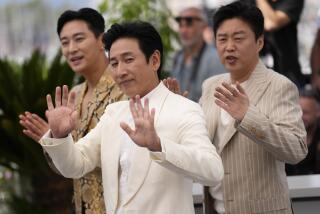Case of Internet economic pundit Minerva roils South Korea
- Share via
SEOUL — He was a self-styled Internet prophet, an economic pundit who went by the name of Minerva, after the Roman goddess of wisdom.
In weblogs posted last year that drew a cult-like following, he pontificated on South Korea’s ailing economy, castigated policymakers and forecast dire scenarios that many investors took to heart. He was a genius, they said, a mysterious inside trader with a Matt Drudge-like acumen for scoops that uncannily predicted the global economic crisis.
But prosecutors say he crossed the line. On Thursday, Park Dae-sung appeared in Seoul’s Central District Court, handcuffed and in a light-gray jail jumpsuit, as his attorneys made a motion to dismiss charges that as Minerva he spread false rumors damaging to the government’s reputation in the world financial market.
In a Dec. 29 posting, the online commentator wrote that the government had ordered financial institutions to stop buying dollars as it tried to curb the fall of the won, South Korea’s currency, against the greenback.
The posting devastated the local foreign exchange market, forcing the nation’s financial authority to spend $2 billion to bolster the won as the demand for dollars surged wildly, prosecutors say.
Park’s arrest has pierced the Minerva mystique. He reportedly has told authorities that he had never invested in stocks or gained financially from his postings. Park, who is unemployed, has said he briefly attended community college and never believed his writings would jeopardize his nation’s economy.
“I’m not a serial killer,” he reportedly told his lawyers before the proceeding. “Frankly, I’m scared. It’s scary that I should talk with my hands handcuffed.”
The arrest also has triggered a fierce debate over freedom of expression in South Korea. Park’s supporters insist that he was merely a blogger expressing his opinions and that the charges against him jeopardize the integrity of the nation’s Internet culture.
Prosecutors counter that the government needs to bring more accountability to Internet postings.
Last year a well-known actress committed suicide after what police called an act of cyber-terrorism. Choi Jin-sil hanged herself amid a barrage of postings claiming that she had lent large amounts of money to an actor who took his own life.
Park Chan-jong, a former National Assembly member who is representing Park Dae-sung, said the two cases were different because his client was merely expressing his opinion and was not engaged in personal attacks.
Debate over the two cases comes as government officials are pushing to introduce new clauses in communication laws to enforce harsher punishment for cyber-insults. The country also is preparing to broaden a law that requires Internet service providers to confirm social security numbers and the real names of users.
The Internet is deeply ingrained in South Korean society, where 9 in 10 households have access to broadband. The nation’s computer usage is among the highest in the world, with each user online an average of 34 hours a month, according to a 2007 survey.
Police say the arrest of the man alleged to be Minerva has led to additional cases of cyber-hostility. The Seoul judge who issued the warrant for Park’s arrest was the victim of an Internet assault in which his picture, birth date and academic background were published online with demands for his impeachment, they say.
“A healthy discussion is good, but there should not be a personal attack,” media reports quoted one prosecutor as saying.
And a radio talk show host who dismissed Minerva as a “fortuneteller” was deluged with 1,000 e-mails, many of them attacking the host.
Experts say such responses are predictable in the Internet age. “It is a phenomenon that happens not only in South Korea but globally,” said Chun Sang-chin, a sociology professor at Sogang University in Seoul. “Minerva shows ordinary citizens’ uprising against elite leaders.”
The government is increasingly sensitive to negative reports on the economy, one of the hardest hit in Asia by the global financial crisis. Last year the won’s value fell more than 20% against those of other currencies.
The government crackdown has been lauded by some. One newspaper editorial said studies showed that the level of aggressiveness in an Internet attack was six times stronger than that of a face-to-face confrontation. “Last year, many people took their lives, quit their jobs or left school and moved away because of online violence,” the editorial said.
One survey said 60% of 640 corporate leaders, lawyers and academics queried supported the case against Minerva.
Others say officials are going too far. Analysts say they have been under pressure not to voice negative views on the economy as a result of the case.
Attorney Park told The Times that his client became obsessed with the economy after a friend’s father committed suicide during the 1997 Asian financial crisis. Park Dae-sung saw his postings as a way to help ordinary citizens.
In his blog entries, which authorities say drew hundreds of thousands of Internet views, Minerva indicated that he had once worked in the financial field in the U.S., according to news reports.
Park fears he can no longer lead a normal life, his lawyer said. “It’s so burdensome that online writings can develop into a political incident,” Park told his lawyer.
Meanwhile, in another online debate that shows the fickle nature of cyberspace, Web users are questioning whether Park is really Minerva after all.
--
More to Read
Sign up for Essential California
The most important California stories and recommendations in your inbox every morning.
You may occasionally receive promotional content from the Los Angeles Times.











